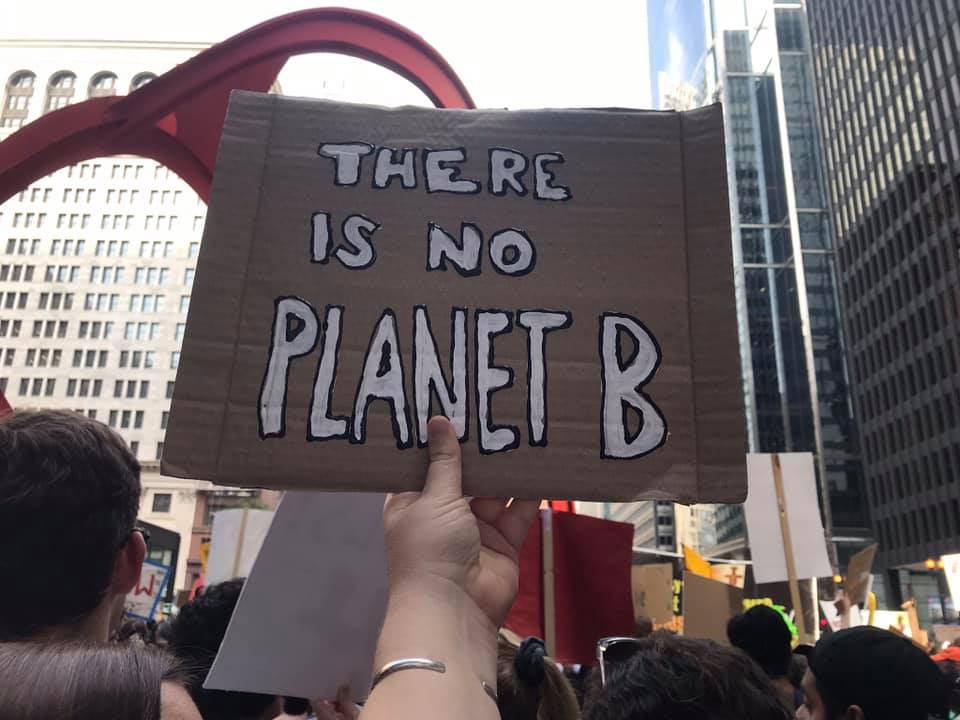
SFYN Chicago Joins Climate March, 2019. Images courtesy of Alice D’Orlando.
Written by Amelia Keleher (SFYN USA Communications Team)
Sitting around a table with people and enjoying something together… I just think that’s truly one of our finest human moments. And definitely something I cherish. — Alice D’Orlando
Alice graduated from the University of Wisconsin-Madison in 2017, where she studied Spanish, environmental studies, and agronomy. She joined SFYN Chicago in early 2019 and is currently the chapter director. Alice is also a member of the Slow Food Youth Network USA Leadership Board.
“Sustainabilitizing” our Future
As a young girl, Alice had a teacher named Mr. Conaway, “who just really instilled these environmental ideals in me.” In college, Alice was able to pursue her passion for food and agriculture and explore questions related to agriculture and mass food production. These days, the burning question in Alice’s mind is: “How can we sustainabilitize [food systems]?” She laughed as she admitted how often she uses this made-up term, and said: “I think we should just coin it as a real word!”
Dishing up Slow Food at UW-Madison
Like fellow SFYN Leader Wally Graeber, Alice participated in the Monday $5 Family Dinner Nights held on the UW campus. The dinners are put on by the university’s Slow Food chapter, which was established by students mentored by Dr. Lydia Zepeda back in 2007. Alice also interned at UW’s Slow Food Café, a student-run, weekly pop-up initiative to bring affordable, convenient and local food to busy students. “It was cool to have local food accessible in the middle of your day on campus,” Alice said.
As one of the café’s suppliers, Alice worked with a group of students to scale recipe quantities, order the ingredients and pick them up from farmers at the Dane County Farmers’ Market. (The weekly market is supposedly the largest producer-only farmers’ market in the country!)
“Having a part in sourcing the food, cooking it, and plating it, and then even walking it out to someone’s table… just seeing that connect and knowing where [the food] came from and knowing that I was a part of it just made me so happy and has had such an influence on me,” Alice said.
Launching a Slow Food Chapter
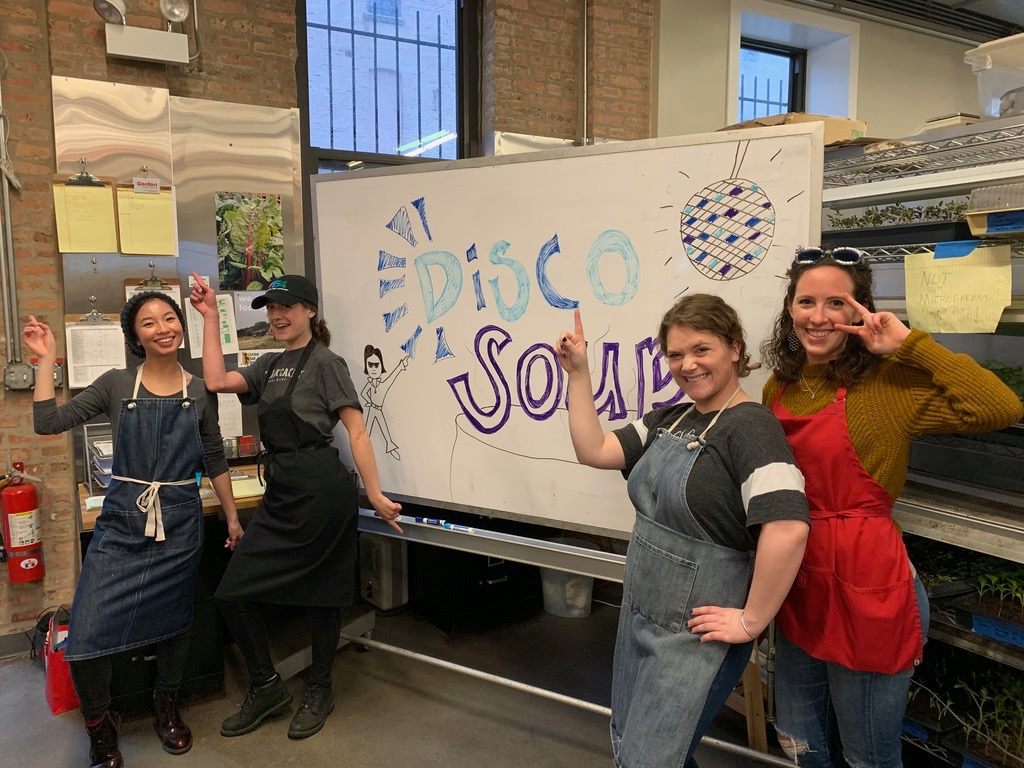
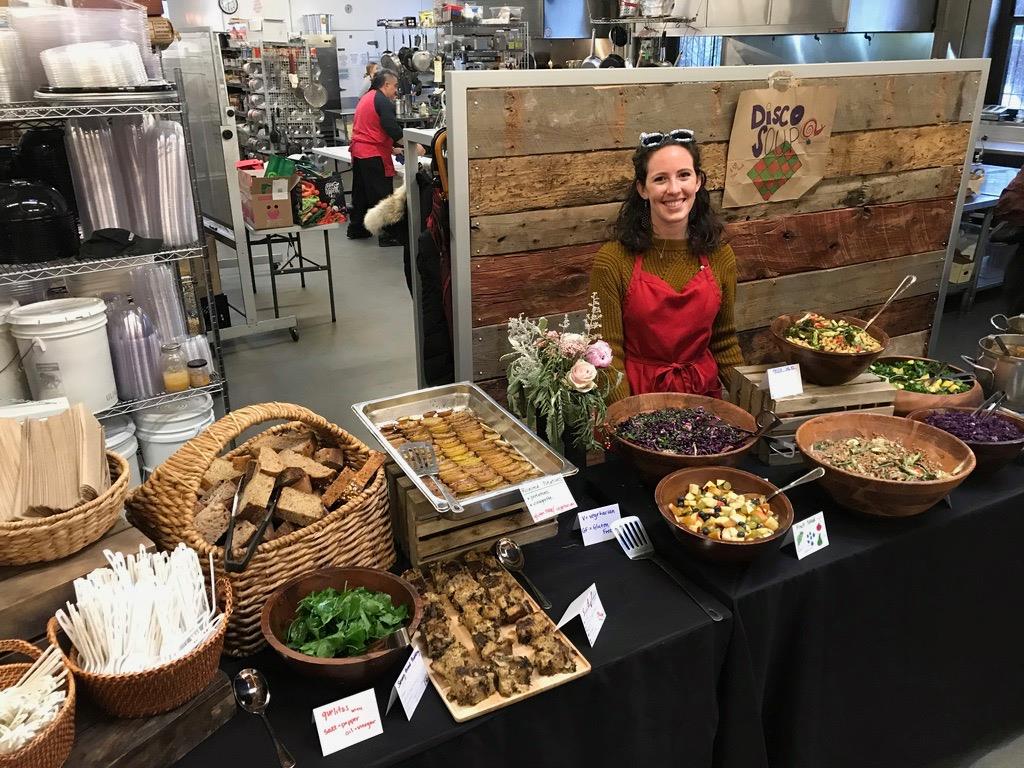
Left to right: SFYN Chicago Members, Alice, and Kirby on Disco Soup Day.
After finishing school, Alice moved to Chicago, where she met Kirby Barth through some Slow Food UW connections. Kirby had just returned from Terra Madre, the bi-annual Slow Food International meeting held in Turin, and was inspired to start her own SFYN community. Alice immediately hopped on board.
Alice worked alongside Kirby to launch SFYN Chicago with World Disco Soup Day, an annual SFYN event aimed at spreading joy and reducing food waste. The event was quite the success, according to Alice, with upwards of 20 volunteers showing up to cook, decorate and help with the general preparations. An additional 30 people showed up just to eat. Attendees were served a delicious meal made from foods that would otherwise have been wasted. “We had resounding positive feedback,” Alice said. “People were really inspired.”
Alice said that the launch of SFYN Chicago was really the chapter’s “shine moment.” For Alice personally, the event tied together her passion for knowing where food comes from and being able to put it on people’s plates, making it a deeply satisfying accomplishment in her past year as a SFYN leader.
SFYN Chicago: Joys & Challenges
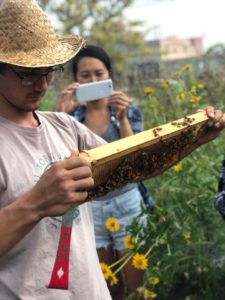 Following World Disco Soup Day, SFYN Chicago hosted a variety of other events, including an Urban Rooftop Farm Tour, a beekeeping session, a tour of one of Chicago’sfarmers markets and a tour of a local coffee roastery. Some of the chapter’s members also participated in a climate march and volunteered at a local food pantry.
Following World Disco Soup Day, SFYN Chicago hosted a variety of other events, including an Urban Rooftop Farm Tour, a beekeeping session, a tour of one of Chicago’sfarmers markets and a tour of a local coffee roastery. Some of the chapter’s members also participated in a climate march and volunteered at a local food pantry.
Despite the joy of coming together over food to build community and a better food system, Alice admits that running the SFYN chapter has been challenging. About one year ago, Kirby decided to pursue a master’s at the University of Gastronomic Sciences in Pollenzo Italy and handed the board leadership off to Alice.
As the new chapter director, Alice’s first initiative was to build out the actual leadership board with event coordinators, volunteer coordinators, and a social media manager. Alice said these positions offer more than community leadership experience — they’re an excuse to hang out with people your age who love talking about food. Yet because they are unpaid, it’s been challenging to recruit a diverse representation of Chicagoans. Another challenge has been figuring out how to ensure a good turnout to match all the time and effort that goes into organizing their events.
Physical Spaces & Community Building
According to Alice, Dr. Zepeda said that one of the things that makes Slow Food UW so successful is having a physical space where people can come together to eat good, clean, and fair food and talk food politics. Having faculty support and being in the city of Madison, which is itself a big food hub, were likely other important factors in the organization’s success.
This year, Alice’s goal with SFYN Chicago was to go into schools and do hands-on work with youth. Yet in these times of social distancing and remote learning, Alice finds herself wondering: “What can we do that’s impactful when we’re not able to meet in person?”
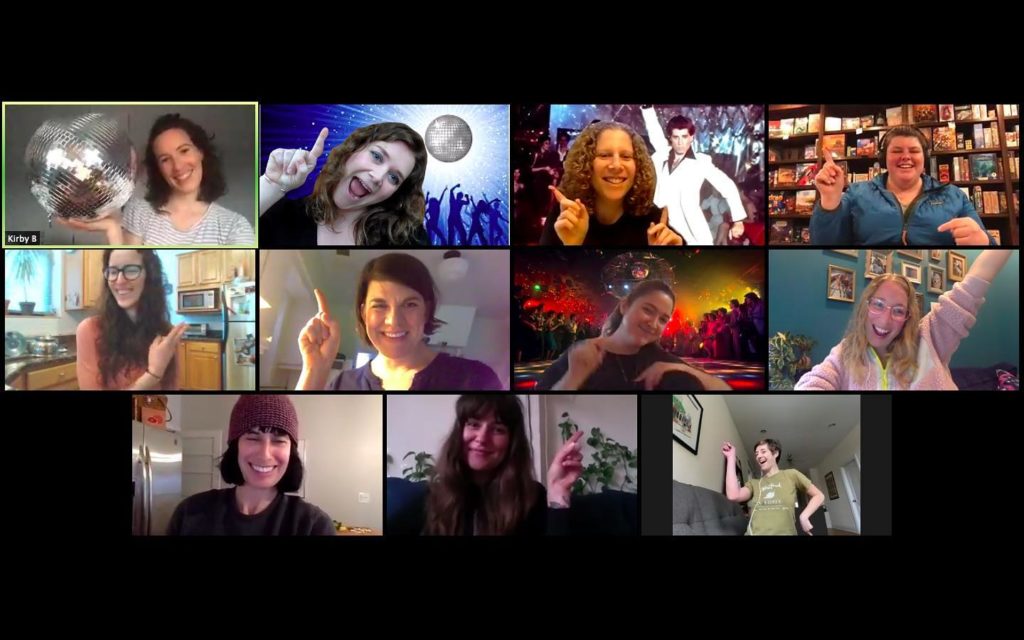
Disco Soup Day Goes Virtual, April 2020
Previously, members of SFYN Chicago would gather monthly to discuss ideas, with the group assigning event planning and volunteering tasks to each person. Yet without a clear sense of how to carry forward during the COVID-19 pandemic, the chapter’s work is currently on pause. “How am I supposed to relate to you over food if we can’t share food right now?” Alice asked. Maybe a creative answer can be found in rethinking the very concept of “community” and what that looks like when people aren’t able to be in the same physical space.
Can Nonprofits Address Climate Change?
As a senior in college, Alice spent six months interning at a non-profit focused on local foods in Madison. While she believes that nonprofits can do really great work at the local level, Alice is currently feeling skeptical of how impactful they can be on a larger scale. Alice believes that national organizations like Slow Food USA are important but limited in their ability to enact “on-the-ground” change and put forward clear action plans.
“If SFYN USA could get a representative in every state, we could be so successful as a movement,” Alice said. She also wants to see local SFYN chapters do the important and often challenging work of addressing diversity and inclusion. “It pains me that the majority of the people I’ve interacted with in my country’s Slow Food community are white-presenting women. We can’t run a movement. We don’t have enough voices here. This isn’t encompassing our entire community,” she said.
Carbon Emissions & Green Capitalism
What the climate needs to avoid collapse is a contraction in humanity’s use of resources; what our economic model demands to avoid collapse is unfettered growth . . . — Naomi Klein, author of This Changes Everything
“We need to pay more attention to carbon emissions,” Alice stated. She believes that begins with eating less meat, since meat consumption is directly tied to industrial agriculture. Specifically, corn and soy production, which are produced in large-scale monocultures that lead to soil degradation and have other harmful social and environmental impacts.
Alice also regards food waste as a pressing issue. “We just have so much food rotting away unnecessarily. We should have industrial composting everywhere,” she said. Instead, 30-40% of the U.S. food supply is wasted, causing the system to need to produce more and more in order to feed a growing population. Alice said we need to be redirecting that food to the food insecure. “I think that people are passionate about [these issues], and people in our generation are looking to make those changes,” she added.
Alice said she’s banking on organizations like Beyond Meat, whose mission is to give meat eaters a delicious and sustainable alternative, and Imperfect Foods, a subscription delivery produce box composed of misshaped or surplus foods. Even if these for-profit organizations don’t necessarily encompass the Slow Food values that Alice advocates, she still believes that they have a significant chance of solving the food side of our climate problem.
Yet scholars and activists such as Naomi Klein argue that these organizations are merely practicing green capitalism, which assumes that environmentalism and capitalism can work together to protect the environment. This criticism is founded in the view that capitalism — no matter how “green” — cannot address the social inequities in our food system and that profit and growth are inherently at odds with protecting our environment.
A Place at the Table
Alice concluded by saying, “It’s nice to be in on the conversations,” especially with youth who are energetic about making change. How will organizations like SFYN Chicago and Slow Food USA, who are working to secure good, clean and fair food for all ensure that a wide range of voices has a place at the table?
Suggested Reading
- “Can Self‐Determination Theory Explain the Self‐Perpetuation of Social Innovations? A Case Study of Slow Food at the University of Wisconsin—Madison” by Anna Reznickova and Lydia Zepeda
- “Innovative millennial snails: the story of Slow Food University of Wisconsin” by Anna Reznickova and Lydia Zepeda (Contact lzepeda@wisc.edu for access)
- “Yes, alternative meat can help stop climate change. Here’s why.” by Chris Taylor
- Green Capitalism? Business and the Environment in the Twentieth Century edited by Hartmut Berghoff and Adam Rome
- This Changes Everything: Capitalism and Climate Change by Naomi Klein
- ‘Green capitalism’ is a myth by Christopher Wright and Daniel Nyberg

